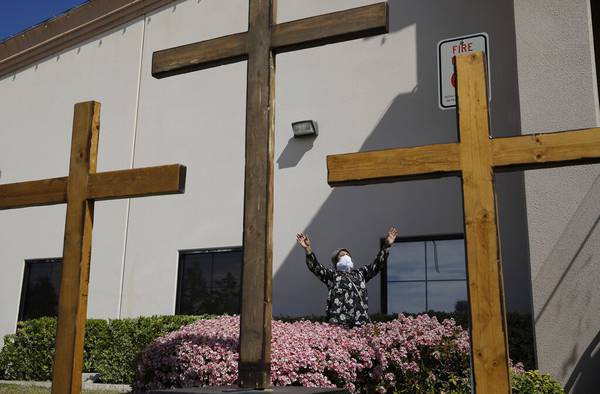RENO —
Lawyers for the state of Nevada say the 50-person cap placed on worship services due to the coronavirus doesn’t infringe on constitutional protections of religious freedom because it doesn’t target anyone’s ideology or opinion.
“The right to practice religion freely does not include liberty to expose the community … to communicable disease,” the state argued in documents filed this week in the 9th U.S. Circuit Court of Appeals in San Francisco.
“Temporarily narrowing restrictions on the size of mass gatherings, including for religious services, does not outbalance the health and well-being of Nevada citizens,” it said.
A church in rural Lyon County is appealing after a federal judge upheld the state's policy — as most U.S. judges have done in other states, with some exceptions. A divided U.S. Supreme Court rejected an emergency appeal by a California church May 29 that challenged state limits on attendance at worship services.
Judge Richard Boulware II in Las Vegas refused repeated requests from Calvary Chapel Dayton Valley to temporarily lift the hard cap and subject churches to the 50% capacity rule at casinos, restaurants, bars, gyms, amusement and water parks.
The church east of Reno is seeking an emergency court order from the 9th Circuit prohibiting enforcement of the cap while the appeal is pending. Church leaders say it treats them more severely than casinos and other secular activities in violation of the Constitution. They want to allow 90 people in the 200-capacity sanctuary.
“Unless this court intervenes, Nevada will continue putting a thumb on the scales against the free exercise of religion,” the church's lawyers wrote in the June 22 appeal.
Nevada's lawyers say the U.S. Supreme Court repeatedly has recognized that the Constitution reserves power to the states to regulate public health, safety and morals.
“If the orders do not target religion, the First Amendment has not been offended,” they wrote.
Lawyers for the state said complaints that mass gatherings must be treated the same as every aspect of commerce “have been rejected by numerous courts throughout the United States, including the Supreme Court and the Ninth Circuit.”
The lawyers didn’t mention a case in New York last week where a U.S. judge blocked that state from enforcing COVID-19 restrictions limiting religious gatherings to 25% capacity when other types of gatherings are limited to 50%.
But Nevada's lawyers emphasized the 9th Circuit specifically ruled in the case that went to the Supreme Court that when a state "does not in a selective manner impose burdens only on conduct motivated by religious belief, it does not violate the First Amendment.”
Chief Justice John Roberts joined the court’s four liberal judges in May in turning away a challenge from the South Bay United Pentecostal Church in the San Diego area. He wrote that California's restriction allowing churches to reopen at 25% of their capacity, with no more than 100 worshipers at a time, “appear consistent” with the First Amendment.
Roberts said similar or more severe limits apply to concerts, movies and sporting events “where large groups of people gather in close proximity for extended periods of time.”
Nevada insists it “treats religious organizations better or the same as other mass social gatherings that are most similar to it in how people congregate together and communicate.”
Movie theaters are subject to the same 50-person cap. Museums, art galleries, zoos, aquariums; trade schools and technical schools are among those subject to either the hard cap or limited to 50% capacity, whichever is less. Concerts and sporting events are prohibited altogether.
Boulware said when he ruled against Calvary Chapel that to prove selective enforcement, the church must demonstrate the state is only enforcing the directive against places of worship. He also rejected arguments that churches are analogous to casinos, noting that casinos are licensed by the state and subject to substantial additional restrictions by gambling regulators.
The church's lawyers said in a reply filed late Wednesday that none of the state's “excuses for treating assembling better than religious gatherings pass muster.”
“They amount only to the offensive claim that for-profit assembles are important and religious gatherings are not,” they wrote. “It defies reason to claim that filling indoor theme parks at 50% capacity is perfectly tolerable while allowing churches to host worship gatherings at 50% capacity is not.”

